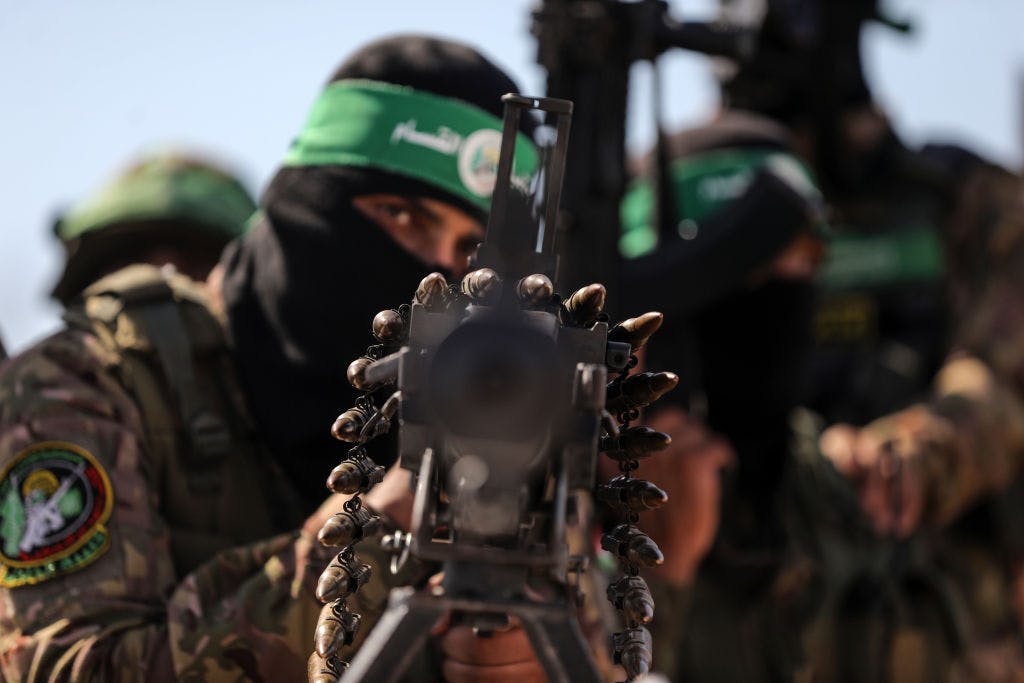Published: 16 April 2024
Last updated: 16 April 2024
Last week The Jewish Independent published an editorial calling on Israel to end the Gaza war. The editorial argues Israel’s six-month old war against Hamas is “fundamentally a failure”, as the Jewish state has failed to achieve its two stated aims of returning the hostages abducted on October 7 and eliminating the terror organisation, and in the process has turned Gaza into a human catastrophe and itself into a pariah state.
To argue the war should continue would doubtlessly strike many decent people as monstrous. But as the weekend’s unprecedented Iranian attack on the Jewish state demonstrates, the Middle East is a volatile place where military and political calculus typically involves weighing the horrific against the unthinkable to arrive at a decision just shy of the apocalyptic.
At the least, I consider it intellectually limp not to grapple, and the editorial does not, with the cost of Israel ending the war, whatever that means. In recent weeks the Israel Defence Force has withdrawn most of its soldiers from southern Gaza; it is unclear if this signals a shift to smaller, targeted incursions or if the troop pullback is temporary ahead of a large-scale assault on Rafah, where the last half a dozen or so Hamas battalions are reportedly holed up in the tunnels.
And the consensus among independent Israeli defence analysts and politicians, including staunchly anti-Netanyahu politicians, is that Israel must, at some point and in some fashion, confront the remaining Hamas formations both, to borrow a phrase from the editorial, for its own sake as well as for any hope of a peaceful future.
I know this because last month I travelled to Israel on a media trip organised by the Australia/Israel & Jewish Affairs Council — yes, one of those pro-Israel “junkets” that according to the journalists’ union and many of my colleagues transmutates previously sceptical journalists into lifelong agents of Zionist influence.
Should Hamas remain undefeated, free to pursue its stated goal of repeating October 7 “again and again,” would the internally displaced Israeli civilians from the border communities of the south feel safe to return to their homes?
The case for persisting with the war is put most persuasively, in my view, by Benny Morris, whose work is invoked frequently, if erroneously, to prove Israel is illegitimate from birth. As one of the “new historians” of the 1980s, Morris unearthed archival material contradicting Zionist myths that Palestinians fled their homes of their own free will during Israel’s War of Independence. To the disappointment of his anti-Zionist fans, Morris brings the same unsentimental clarity to Israel’s current predicament as he did to its foundation story.
Writing in The New York Times last week, he first set out the case against an assault on Rafah, starting with the inevitability of many more civilian deaths among the 1.4 million Gazans sheltering there, and ending with the ratcheting up of tensions to full-scale regional war.
Against this hefty list of worst-case scenarios Morris suggests one that’s worse still: a Hamas victory.
No military action will exterminate Hamas, the editorial argues, “short of an unthinkable genocide against the entire population of Gaza”. Depressing, really, when even a Zionist publication such as TJI parrots the most defamatory of anti-Israel propaganda. Even if, heaven forbid, the IDF were to kill hundreds of thousands more Gazan civilians in a final bid to eliminate Hamas, the mass killing still wouldn’t constitute genocide, whatever the ideologues of the UN and its associated NGOs might say about the matter, because the objective would not be wiping out a people but defeating a fanatical enemy.
Lest this needs saying: should Israel proceed with an operation in Rafah it must devise a viable plan to protect Gazan civilians unless the Jewish state wishes to undermine what’s left of its moral authority and fatally imperil its alliance with an increasingly exasperated Biden administration.
Such a plan, for instance shifting the population west, would be logistically complex, to put it mildly, although not necessarily beyond the capability of the start-up nation. It may well, as Israel’s unacceptably sluggish approach to the delivery of humanitarian aid suggests, be beyond the political capability of a Netanyahu government beholden to its far-right coalition partners. That, however, is another question.
“Islamic fundamentalist terrorism has not been fully vanquished anywhere in the Middle East entirely by military means, and Gaza is no exception,” the editorial continues — wrongly. Islamic State in Syria and Iraq was vanquished militarily — certainly not through polite persuasion, anyway. The terror group no longer controls territory, is no longer a state or an army, even if it still carries out isolated attacks.
I can’t see a way out of the editorial’s central contradiction, namely, that the prerequisite to peace between Israel and the Palestinians is the removal of Hamas and yet the cost of removing Hamas militarily is so high as to be prohibitive.
In a similar vein, Hamas no longer controls Gaza’s north though it persists in insurgent attacks, such as its recent re-occupation of Shifa hospital. Israel, or some other force, will likely have to spend years fighting a counter-insurgency. Acknowledging that grim reality is very different to saying Hamas cannot be defeated.
I’m not sure when or how we decided that defensive wars, be they in Gaza or Ukraine, had to be short, painless and not really wars at all.
“By continuing the war,” the editorial says, “Israel is only adding to the anger of a new generation of Hamasniks, radicalised Palestinian refugees who experience Israel as an oppressor and believe that October 7 was a justified attack on an enemy to be vanquished by any means necessary.”
Frankly, I doubt it’s humanly possible for the radicalised Palestinians to be any more “Hamasnik” than they are already.
But the hateful fascism of wartime Germany and Japan, for instance, died with their respective regimes. The argument that the suffering of Palestinians in Gaza will sow the seeds of future hate has more than a whiff of Orientalism, with its romantic evocation of the angry Muslim incapable of insight or self-correction, doomed to nurse rage and resentment down the generations. It is untrue: within years of yet another humiliating military defeat in 1973, Egypt signed a peace treaty with Israel.
I can’t see a way out of the editorial’s central contradiction, namely, that the prerequisite to peace between Israelis and the Palestinians is the removal of Hamas and yet the cost of removing Hamas militarily is so high as to be prohibitive.
Perhaps negotiators can arrange a safe passage for Yahya Sinwar, Hamas’s psychopath in chief in Gaza and his associates to Qatar or Turkey where they can live it up for the rest of their days satisfied in the knowledge they’ve helped tens of thousands of their former subjects attain martyrdom with its attendant conga line of waiting virgins. This would count as a good outcome by the standards of the Middle East.
But it’s an outcome entirely contingent on the acquiescence of the Hamas leaders in their subterranean headquarters and thus far their strategy of sacrificing their defenceless population so as to heap pressure on Israel to prematurely lay down its arms is going swimmingly.
This brings me to the 132 remaining hostages, a subject so painful it’s almost unspeakable – certainly, the UN, the NGOs, the Red Cross et-al rarely speak of it. Israel has the power to bring about Hamas’ military defeat and removal from power, but Hamas, by holding captives, has the power to frustrate that aim, which was why they took hostages in the first place.
We might legitimately worry Benjamin Netanyahu is resisting a hostage deal for fear of collapsing his government although this theory assumes the broader Israeli public supports the editorial’s call to negotiate “a permanent end to the war in exchange for the return of all hostages”. I’m not sure that’s true. In any event, it is nonsensical to demand from Israel an outcome over which it has limited control. It is unclear how many hostages are even alive.
A better future for Israeli and Palestinian children hinges on the emphatic defeat of Hamas.





Comments4
Michael Collins17 April at 06:36 am
So the elimination of Hamas, a group incapable of threatening Israel’s security as a state, would justify the killing of hundreds of thousands of Palestinians? I suspect that genocidal fantasy will get a wider audience, and the only people more alarmed to read it than pro-Palestinians, will be the Leiblers, who will have to decide whether to defend it or not, when asked about it.
Jonathan Keren-Black16 April at 11:49 pm
Julie, I am surprised and disappointed. Clearly the journalist junket visit was good value for Netanyahu and his crew.
Kevin Judah White16 April at 09:07 am
Before quoting approvingly and uncritically from the Benny Morris NYT article, I recommend reading the Comments from readers on the article which reveal the flaws in his approach. Then again, this is the same Benny Morris who invoked crude stereotypes of the Arab world arguing that it is ‘barbarian’ and that in Islam, ‘human life doesn’t have the same value as it does in the west’, which explained why they ‘will commit genocide’. He also compared the Palestinians to ‘a wild animal that has to be locked up.’
Wesley Parish16 April at 08:01 am
I read this OpEd asking myself, “What if we swap the names around?”
Eg, “A better future for Israeli and Palestinian children hinges on the emphatic defeat of Netanyahu, Smotrich, Ben Gvir, et al.” Or “Jewish fundamentalist terrorism” … Try it. It will lead to a better article.
Then also, the constant comparison of Hamas to the Nazi Party is grotesque. It’s implicit in the phrase “But the hateful fascism of wartime Germany” – of course, it neatly ignores the fact that the Nazi Party through its control of the German state, controlled most of the Europe where it committed its atrocities. Alleging that Hamas controls Israel, indicates a disconnection to reality. And likewise, it ignores the atrocities Israel has regularly committed against Palestinians. Repeat that claim against the background of the IDF treatment of the Great March of Return 2018-2019, and tell me who’s the terrorist regime again.
And disparaging the charge of genocide – I’ve read the South African legal arguments, and a very strong case was made that Israel had fulfilled the conditions for breaching these parts of the definition in the Genocide Convention: Art. 2 (c) Deliberately inflicting on the group conditions of life calculated to bring about its physical destruction in whole or in part;
(d) Imposing measures intended to prevent births within the group;
And Netanyahu and his gang of thugs condemned themselves out of their mouths – the SA case merely had to quote them. I know what the reference to Amalek is, thank you very much. And as a likely descendant of Amalek through my Levy ancestors – it’d be guaranteed if I was a Cohen: rank hath its privileges – I think it’s a load of bollocks.